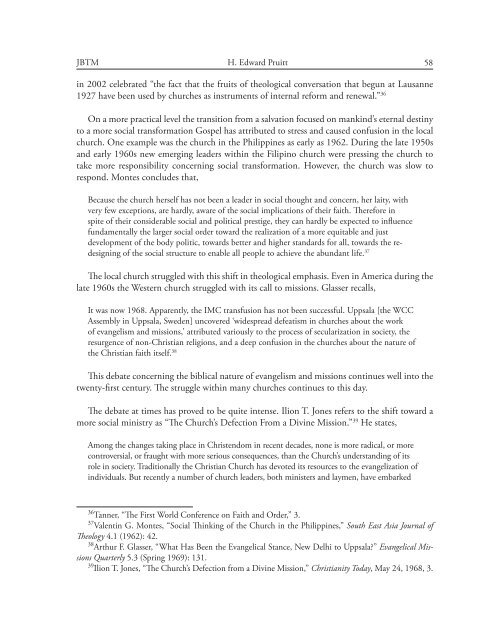JBTM_10-2_Fall_2013
JBTM_10-2_Fall_2013
JBTM_10-2_Fall_2013
Create successful ePaper yourself
Turn your PDF publications into a flip-book with our unique Google optimized e-Paper software.
<strong>JBTM</strong><br />
H. Edward Pruitt<br />
58<br />
in 2002 celebrated “the fact that the fruits of theological conversation that begun at Lausanne<br />
1927 have been used by churches as instruments of internal reform and renewal.” 36<br />
On a more practical level the transition from a salvation focused on mankind’s eternal destiny<br />
to a more social transformation Gospel has attributed to stress and caused confusion in the local<br />
church. One example was the church in the Philippines as early as 1962. During the late 1950s<br />
and early 1960s new emerging leaders within the Filipino church were pressing the church to<br />
take more responsibility concerning social transformation. However, the church was slow to<br />
respond. Montes concludes that,<br />
Because the church herself has not been a leader in social thought and concern, her laity, with<br />
very few exceptions, are hardly, aware of the social implications of their faith. Therefore in<br />
spite of their considerable social and political prestige, they can hardly be expected to influence<br />
fundamentally the larger social order toward the realization of a more equitable and just<br />
development of the body politic, towards better and higher standards for all, towards the redesigning<br />
of the social structure to enable all people to achieve the abundant life. 37<br />
The local church struggled with this shift in theological emphasis. Even in America during the<br />
late 1960s the Western church struggled with its call to missions. Glasser recalls,<br />
It was now 1968. Apparently, the IMC transfusion has not been successful. Uppsala [the WCC<br />
Assembly in Uppsala, Sweden] uncovered ‘widespread defeatism in churches about the work<br />
of evangelism and missions,’ attributed variously to the process of secularization in society, the<br />
resurgence of non-Christian religions, and a deep confusion in the churches about the nature of<br />
the Christian faith itself. 38<br />
This debate concerning the biblical nature of evangelism and missions continues well into the<br />
twenty-first century. The struggle within many churches continues to this day.<br />
The debate at times has proved to be quite intense. Ilion T. Jones refers to the shift toward a<br />
more social ministry as “The Church’s Defection From a Divine Mission.” 39 He states,<br />
Among the changes taking place in Christendom in recent decades, none is more radical, or more<br />
controversial, or fraught with more serious consequences, than the Church’s understanding of its<br />
role in society. Traditionally the Christian Church has devoted its resources to the evangelization of<br />
individuals. But recently a number of church leaders, both ministers and laymen, have embarked<br />
36 Tanner, “The First World Conference on Faith and Order,” 3.<br />
37 Valentin G. Montes, “Social Thinking of the Church in the Philippines,” South East Asia Journal of<br />
Theology 4.1 (1962): 42.<br />
38 Arthur F. Glasser, “What Has Been the Evangelical Stance, New Delhi to Uppsala?” Evangelical Missions<br />
Quarterly 5.3 (Spring 1969): 131.<br />
39 Ilion T. Jones, “The Church’s Defection from a Divine Mission,” Christianity Today, May 24, 1968, 3.


